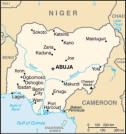Ill-prepared Nigeria battles bird flu
Villagers in this settlement of mud houses in Nigeria's northern Kaduna state say their chickens have been dying in large numbers for a month of a strange disease.

Six days ago, Africa's first case of a deadly bird flu strain was confirmed among birds at nearby Sambawa Farms, a large-scale commercial farm owned by Nigeria's Minister of Sports Samaila Sambawa.
But so far no help has come to Birnin Yaro Gari as Nigeria battles bird flu ill-prepared, the impact of sorely needed foreign help yet to be felt. International experts fear the disease may have had time to spread widely before Nigerian officials realized what they faced.
Sunday, a top Nigerian health official said two Nigerian children living near Sambawa Farms may have contracted the H5N1 bird flu strain, which has killed humans elsewhere.
State and federal officials took samples from the children and others in their family and sent them abroad for testing, Abdulsalam Nasidi, a federal Health Ministry official, said after visiting the family. If it is confirmed they have the virus, they would be the first human cases in Africa.
Nasidi gave few other details and refused to say where the tests were sent. He said the children "are in fairly good condition ... but we are still observing them."
Federal government and regional health officials said they will start screening people Monday who have worked on farms hit by bird flu.
So far, H5N1 has passed only from birds to humans, but experts want to monitor it carefully for fear it could evolve into a virus that can be transmitted easily between people and become a pandemic.
Humans appear to catch the disease through their respiratory tract, possibly by breathing in the virus from birds' fecal matter.
In Birnin Yaro Gari, most villagers said they have heard it is best to kill chickens that might be infected but would rather watch them die, then throw the bodies into in the bush. The few who choose to kill and burn theirs as experts recommend do so with their bare hands, unprotected by gloves and face masks.
"There is no family in this village that has not lost dozens of birds," said 60-year-old Abdulkadir Birnin, showing the empty pens next to his kitchen inside a mud-walled compound. He said he once had 50 birds. He estimates more than 30,000 birds in the area have died in recent weeks.
Members of a Nigerian veterinary team that killed off the few surviving birds at Sambawa Farms over the weekend reused gloves and body suits meant to be used once because there were simply not enough, reports the AP.
I.L.
Subscribe to Pravda.Ru Telegram channel, Facebook, RSS!


